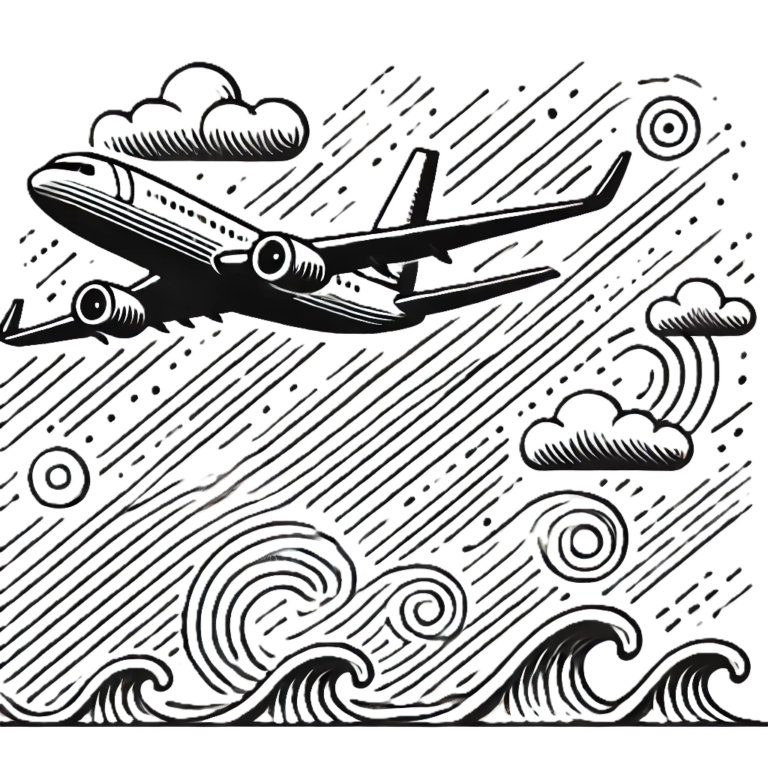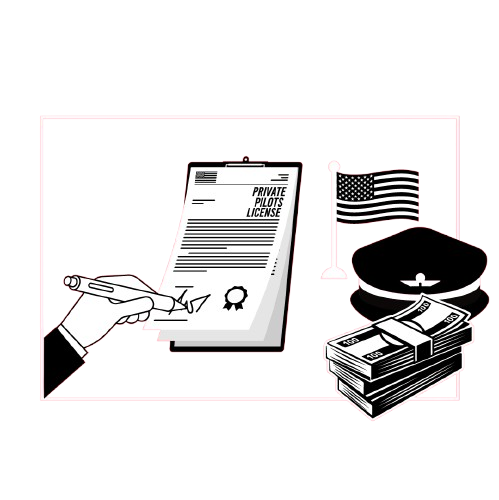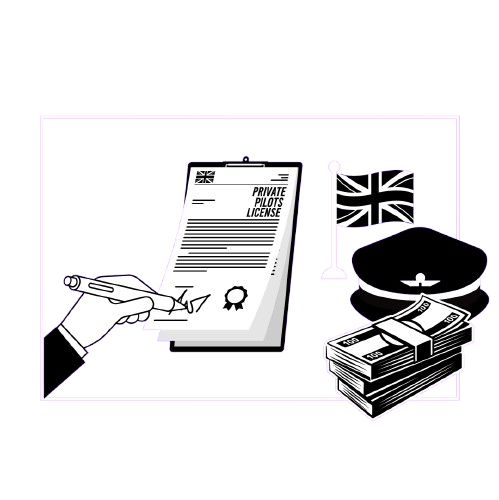What Are The Main Factors Affecting Pilots Salaries?
Factors Affecting Pilot Salaries
Sunday 9th April – 5 MIN READ
THE QUICK ANSWER
The Main Factors Affecting Pilot Salaries Are:
- Seniority – How long the individual has been in the airline. The more senior they are, the higher their payscale and the higher their pay.
- What Aircraft They Fly – Wide-body operators, such as those on the Beoing 777/747, will nearly always earn more money than narrow-body operators.
- The Number Of Flight Hours – The more time spent flying, the more they will be paid.
- Overtime – If a pilot carries out lots of overtime flying, they will likely receive a lot more money.
- Demand For Pilots – The more in demand there is for qualified pilots within the industry, the better the terms and conditions/pay will be.
Want to know about the maximum pilot salaries? Read our in-depth blog post here.
Factors Affecting Pilot Salaries – The Detailed Answer
Commercial airline pilots have always been considered one of the most prestigious professions, and it is a very rewarding career. Indeed, a pilot career can be amazing.
To top it off, the salary package is quite impressive too. You can read our extensive guide about an airline pilot salary here.
But have you ever wondered what factors contribute to the big bucks?
The airline industry is much more complex than it may seem, and various factors come into play when determining the salary.
So what are the factors affecting pilot salaries?
Experience, aircraft type (wide-body Boeing/Airbus usually pay more), regional vs. major airlines, flying hours (flight time), and overtime pay contribute to a pilot’s earnings.
In this blog, we will take you through the factors affecting pilot salaries, how it changes with experience and the impact the ongoing pilot shortage has on their pay.
According to the Bureau Of Labor Statistics, the median salary for airline captains, first-officers and second-officers (sometimes known as copilots), and flight engineers in the United States is $203,010 as of 2021.
Read on to discover everything you need about the factors affecting pilot salaries.
American Airlines Pilot Salary – Everything You Need To Know
- What are the factors that affect a pilot’s salary?
- Factors Affecting Pilot Salaries – Regional vs. major airlines
- The 1500-Hour Rule
- Years of Experience/Seniority
- Aircraft Type
- Do Airline Pilots Make More with Overtime Pay?
- How Long Can an Airline Pilot Work?
- How Does a Pilot’s Pay Increase Over Time?
- Pilot Shortage In The Aviation Industry.
- What Does The Future Hold For Pilots?
- FAQ
- Summary
What are the factors that affect a pilot’s salary?
So what are the factors affecting pilot salaries?
These salaries can vary widely based on multiple factors.
To begin with, the type of aircraft flown, experience level, certifications, and type of employer are all elements that play a significant role in determining the income of a professional aviator.
Those who work for major airlines or private charter companies generally receive a higher salary than those working for smaller companies or regional airlines.
Experience in the industry also weighs heavily, with seniority being a key factor in receiving promotions to more lucrative positions.
Geography also matters as different countries/regions have different salary structures.
Lastly, the market’s demand and supply of qualified flight crew also influence compensation.
A qualified flight crew is in high demand, and those with exceptional skills or specialized in a sought-after aircraft can command a higher salary.
The main factors affecting pilot salaries are experience and seniority at an airline.
Factors Affecting Pilot Salaries – Regional vs. major airlines
So what are the factors affecting pilot salaries?
One of the major factors affecting pilot salaries is whether they work for a regional airline or a major airline.
Those flying for major airlines typically receive higher salaries and enjoy better benefits than regional airline jobs.
Indeed, Delta Airlines pilots just received a 34% pay rise over the next few years, and American Airlines CEO just proposed a 40% pay rise for American Airlines pilots, seeing the top basic salary of these USA-based flight crew hitting $590,000!
Major airlines usually offer more perks like stock options, health insurance, pensions, and more.
Regional airlines, however, may offer more time off and the opportunity to move on to better jobs in the industry.
However, these regional airlines are increasing their median pay substantially to their commercial pilots in an attempt for these flight crew to stop seeing these airlines as ‘stepping-stones’ into the major airlines and instead look at them for a long career.
The 1500-Hour Rule
Normal progression in the United States after flight training/flight school is to achieve a commercial pilot’s license, then work as a flight instructor, followed by several years at a regional airline before joining the major airlines.
This is due to the 1500-hour rule in America set out by the Federal Aviation Administration (FAA).
This is a slightly different career path in the UK/Europe. Pilots can join major airlines straight out of pilot training.
Indeed, in these locations, professional aviators require the necessary certifications, such as an instrument Rating, a CPL, and the rating and 250 flight hours.
It is important to remember that salaries vary by region and airline, so it is important to research and understand the different compensation packages available thoroughly.
You can learn more about this in our in-depth blog post about a pilot salary.
Factors Affecting Pilot Salaries – Years of Experience/Seniority
Is experience one of the factors affecting pilot salaries?
Yes. Years of experience/flight experience is one of the primary factors affecting pilot salaries.
As with most professions, the more experience a pilot has, the higher their salary.
Newly licensed pilots, usually first officers or sometimes known as co-pilots, typically earn less than experienced senior first officers or captains.
This makes it crucial to accumulate flight hours and years of experience within an airline.
Pilots with an average of 5-10 years of experience earn considerably more than entry-level pilots.
Experienced pilots with around 20 years of experience can earn in the highest percentile. This is one of the most important factors affecting pilot salaries.
As mentioned, a pilot on the top of the pay scale at major airlines in America, such as United Airlines, Southwest Airlines etc., will earn a basic salary of over $500,000 a year.
Factors Affecting Pilot Salaries – Aircraft Type
So what are some more of the factors affecting pilot salaries?
The type of aircraft a pilot flies plays a significant role in determining their salary.
Generally speaking, pilots who fly larger, heavier aircraft can earn higher salaries than those who fly smaller planes.
For example, pilots who fly commercial airliners or cargo planes earn more than those who fly smaller, private planes.
However, the specific company or organization that employs the pilot also plays a significant role in determining their salary, regardless of the type of aircraft they fly.
This is why the proposed American Airlines pay deal will see a super-experienced widebody captain earning $590,000 a year but a narrowbody captain earning $475,000.
Do Airline Pilots Make More with Overtime Pay?
Is overtime pay one of the factors affecting pilot salaries?
Yes, airline pilots can make more money with overtime pay.
Flight crew can be paid hundreds to thousands of dollars per hour for working overtime.
The overtime pay rate for airline pilots is usually higher than the normal hourly rate.
However, the overtime pay that pilots receive depends on various factors, such as the airline, the pilot’s experience, and the pilot’s union contract.
It is worth noting that overtime hours may be limited due to regulations to prevent pilot fatigue.
Some airlines also have a maximum number of hours that pilots can work in a month, which can limit their potential for earning overtime pay.
Overall, overtime pay can be a significant factor in airline pilot salaries, but it is just one of many factors that can affect how much pilots earn.
How Long Can an Airline Pilot Work?
Surely, how long a pilot can work for is one of the important factors affecting pilot salaries?
The Federal Aviation Administration regulates the maximum weekly, monthly, and yearly hours can be flown.
The flight crew can work a maximum of eight hours in 24 hours or up to 30 hours in seven days.
However, these hours can be extended under certain circumstances.
With this, the Civil Aviation Authority (CAA) states that pilots can fly a maximum of 100 hours per 28-day period and a maximum of 1000 flight hours annually.
How Does a Pilot’s Pay Increase Over Time?
Pay increases gradually as pilots gain more experience and seniority in their airline.
Initially, new pilots start with an entry-level salary. This first-year salary can be on the low side.
But as they progress, several opportunities for professional growth emerge, helping to increase their earning potential over time.
Some pilots will follow a yearly pay increase as they work up a setout pilot payscale. This payscale can be as few as five years, up to 40 years. However, rarely are they ever quite this long.
For example, a 40-year pay scale would take a pilot 40 years within the airline before earning the maximum salary.
Flight crew will likely also receive a pay rise as they increase in rank. For example, a first officer may receive a pay rise once they become a senior first officer and then a senior first officer a further (and usually significant) pay rise once they progress to captain.
Additionally, a professional pilot can earn more through overtime pay, bonuses, and other incentives, making it a versatile career.
This is one of the biggest factors affecting pilot salaries.
Pilot Shortage In The Aviation Industry
The pilot shortage is one of the main factors affecting pilot salaries.
The aviation industry is experiencing a pilot shortage due to an increased demand for air travel, a reduced number of newly qualified pilots with the required amount of time/experience (partly down to the 1500-hour rule), and aging pilots retiring.
This pilot shortage is massively raising the median salary on offer to many pilots in America and is fueling a never before seen job growth.
This pilot shortage is mainly in America but is starting to impact the UK/Europe.
As a result, airlines struggle to find qualified pilots, forcing them to offer more competitive salaries to attract and retain pilots.
You can read our extensive guide about the pilot shortage here.
This is one of the biggest factors affecting pilot salaries.
What Does the Future Hold for Pilots?
So now we have explored some factors affecting pilot salaries, let’s discuss what the future might look like for aviators.
The future of pilots largely depends on the aviation industry’s demand for air travel.
The COVID-19 pandemic has wreaked havoc on the aviation sector, with the number of flights and passengers decreasing considerably.
Many airlines had to lay off pilots and other staff to stay afloat.
However, with the pandemic over, demand has increased hugely.
Thousands of flights have been canceled over the last year due to the huge demand for air travel returning quicker than airlines can employ pilots.
Therefore, terms and conditions and the base salary for pilots are increasing massively.
Many American airlines offer a very nice signing bonus and other incentives to boost the average salary.
Therefore, it can be said that being a pilot will remain a lucrative profession in the long term.
Still, the aviation sector’s growth and contraction may significantly influence pay rates.
Frequently Asked Questions
How does experience level affect a pilot’s salary?
Experience level can affect pilot salaries, with more experienced pilots earning a higher salary.
Generally, entry-level pilots with less experience will earn less than those who have been flying for many years.
What are some factors that can impact a pilot’s salary?
Seniority – More time in the airline = more pay.
Aircraft Flown – Larger aircraft pay more than smaller ones.
The Number Of Flight Hours – The more time spent flying, the more they will be paid.
Overtime – Pilots can earn thousands of dollars per hour.
What types of airlines tend to offer higher salaries for pilots?
Airlines that tend to offer higher salaries for pilots include major international airlines, cargo airlines, and regional airlines that operate in high-demand areas.
However, salaries can vary widely depending on various factors, including the size of the airline, the type of aircraft, and the specific job duties involved.
How Much Do Pilots Make Per Hour? Per Diem Pay.
Airlines often provide additional pay called flight pay, or sector pay, as it’s often known.
This is often broken down into how many hours per month they fly. More hours = more $.
However, the FAA and the CAA restrict this to a certain number of hours per year.
Are there any additional certifications or levels of education that can increase a pilot’s salary?
Obtaining an Airline Transport Pilot (ATP) certificate or earning advanced ratings in specific aircraft or types of flying can lead to higher pay.
How Do I Become A Pilot?
The first step for many is getting a private pilot license. However, this isn’t required. Instead, find a flight training school with an accelerated pilot training program and great relationships with major/regional airlines.
Conclusion
We have now looked at the many factors affecting pilot salaries.
In conclusion, an aviation career is not just prestigious but also rewarding.
However, before you decide to take flight, it is essential to understand the factors that could affect your earnings.
The factors include but are not limited to, years of experience, total flight hours, aircraft type, overtime pay, and the state of the airline industry.
Aspiring pilots must be aware of these factors when joining the profession to manage their expectations and plan their long-term goals accordingly. To explore more about aviation careers and the requirements for becoming a pilot, read our comprehensive blog.







